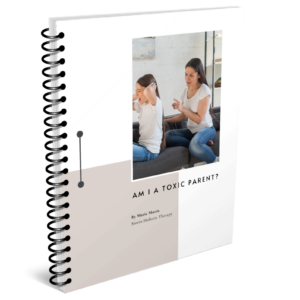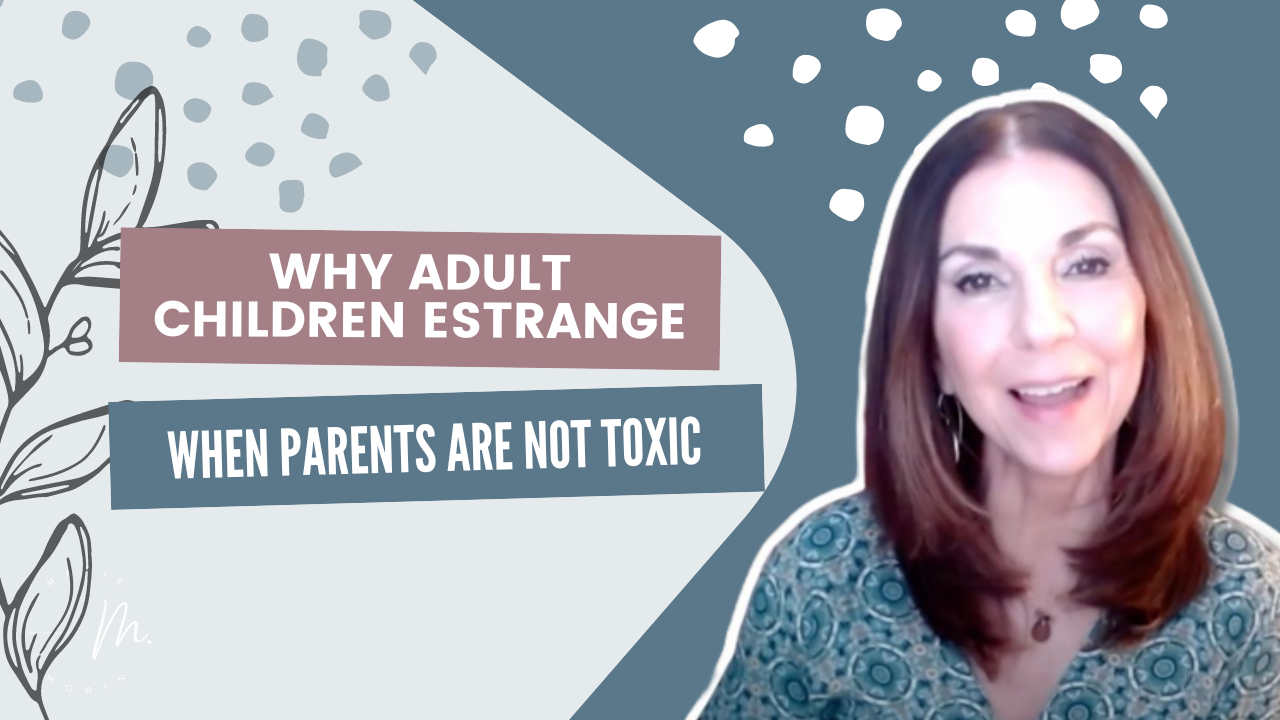Why do adult children estrange? Many estranged adult children will state their parents were toxic. Research shows that toxic parenting is not the only reason for estrangement. In fact, many of the reasons rarely happened singularly. Estrangement hits twenty-seven percent of the United States population, leaving all parties emotionally harmed. The process of cutting off from parents is rarely a quick decision. Instead, estrangement results from years of challenging circumstances. This article discusses Why Adult Children Estrange When Parents Are Not Toxic.
Researcher and social worker Kyle Agilias studied estranged adult children and their parents. In the book Family Estrangement A Matter Of Perspective, she states, “estrangement is larger than conflict; it is entwined in perception, conflicting beliefs, values, behaviors, and goals.” Considering the complexity and differing perspectives, researched sited reasons are best understood as the voices of 78 participants who shared their lived experiences.
What Most Estranged Adult Children Feel
Childhood disconnection is the foundation of most researched adult children’s estrangement. Characterized by feelings of their parental relationship was void of connection. A common theme of adult children is the perception and feeling that their parents had little emotional support to offer them. Adult children said they lacked attention or felt like their parent was not present. There could have been physical disconnection due to divorce. Frequent descriptions of adult children’s participants said they felt like they were the odd ones out, didn’t fit in, and felt like they did not belong to the family unit.
Physical disconnection resulting from lack of attention or presence by the parent- possibly due to divorce contributed to feelings of disconnection.
What the Research Suggests
Agllias’ extensive research spanned an eight-year study of adult children and parents. Estrangement is multifaceted and complex, and Agllias thoughtfully assembles personal lived experiences to inform and guide struggling family members. The estranged individual did not take the decision to cut off lightly. In fact, participants reported, feeling empathy for their cut-off parent. The most common reasons cited by adult children separate are abuse, betrayal, and poor parenting.
Why Adult Children Estrange When Parents Are Not Toxic
Excessive Contact Support and Dependence
For adult kids, tensions rise when there is an increase in reliance on them due to aging and health problems. More than usual mutual or singular reliance increases expectations in parent and adult-child relationships. On the other hand, adult children who are more independent are more likely to view the relationship positively.
Enmeshment
Enmeshment is characterized by a lack of clear boundaries between the parent and the adult child. There is a lack of self-other differentiation between the parties. Like excessive contact and dependence, the relationship undermines the adult child to see themselves as separate and function independently. Notably, personal boundaries are unclear and permeable. For example, enmeshed adult-child relationships may take on their parents emotions such as sadness, and anger, resulting in over-involvement. Enmeshed adult children may feel overly responsible for the well-being of their parents.
Differences in Personal Values
Healthy and dysfunctional families may have heated exchanges regarding differences in values. However strong holds of differing personal values can bring the relationship at an impasse. Sexual orientation, religious beliefs, gender identity, and political beliefs can heighten stress among family members. Tensions over differing beliefs can significantly complicate relationships, particularly when family communication was strained historically.
Life Cycle Events
Life cycle events include the birth of a child, remarriage, the death of a family memeber of close friend, retirement, and divorce are typical like cycle events.
Families with four generations of living relatives, aging parents and grandparents, familes with very young children compounded by life cycle events and other typical indicators can impact family cohesiveness. Poor communication, parental alienation, mental illness, substance use can complicate family tensions along with life cycle events.
Divorce
Adult children from divorced families have a higher likelihood of estrangement. Parents can pressure adult children to take sides and break loyalty to the other parent. Duress from a scorned divorced parent can drive an adult child to seperate to find relief from pressure.
Also, the addition of new relationships can further push relationships to endpoints. Parents expect adult children to befriend one parent more out of loyalty and accept new parties into the family. When communication and hurts have accumulated a common facet of estrangement is divorce.

Am I a Toxic Parent?
TAKE THE QUIZ!
Fill out the form below to let us know where to send your quiz:
Parental Alienation
When parents divorce or seperate, one parent actively and purposefully describes the other parent very negatively to the children. The barrage of negative information about the parent creates long term impacts for the alienated parent. Adult children can take sides due to the perceptions and misrepresentations of the other parent.
Stress Pile-Up
Family systems overload when challenging events occur close together or simultaneously. When families have had more than their share of challenges with little recovery time the family is susceptible to crisis or stress pile up. Family members naturally may react to stressors out of fear, resentments, concern, and anger. Such reactions can be accompanied by poor behaviors, cross words, threats, and harmful fights.
Further complicated the stress pile up are behaviors and historical resentments, hurts, secrets, and individual perceptions and expectations of family members.
Ineffective Communication Patterns
Familiy histories of ineffective communication patters such as lack of resolving problems, not apologizing, and occassional outburts. When patterns continue and members do not feel heard, disrespected and mistreated they can feel discontent over the relationship.
When communication is consistently abusive, adult children leave to preserve their mental health. However not every family is toxic, some try to keep the avenues of communication flowing, however occassionally, unforgiveable offenses involving children and in laws can push people to their limit.
Families can either be highly verbal and very honest or rarely discuss complex issues. On the other hand families can be discouraged from voicing opinions or suffer the consequences of one parent’s displeasure. Dysfunctional families include a lack of empathy, perfectionism, highly critical, lack of privacy, control, and practical communication skills. Families will argue and hold grudges and be disrespectful. Finally, an enormous insult to the fabric of a family is the inability to apologize and work towards resolving family conflict.
Socio-historic and Political legacy
Many parents recite dismay over the once strongly held cultural expectation of adult children. Obligation and duty to family was understood and followed with rare exceptions. Individualsim has changed from the notion of obligation and duty to what the adult child percieves as not good for them.
Kylie Agllias, researcher and educator, notes that the promotion of individualism beginning in the 1960s has created a rise indispensable relationships. Divorce is part of the estrangement scheme and has more autonomy, independence, and self-interest. Family estrangement is not new; however, the societal shift towards individualistic thinking participates in the condition.
Survival and Personal Growth
Considering the current culture of active personal growth and individualism, parents and adult children are at great odds with opposing perspectives. Adult children discuss how they desire productive healthy parent child relationships. Parents may feel they did the best they could, missed the mark at times, provided for them, and do not deserve being rejected.
When parents are toxic, it is understandable that adult children need to save themselves from continued mal treatment.Behaviors that are persistently manipulative, disrespectful, and controlling. But parents feel the heartbreaking decision that their children uphold.
Adult children voice three top reasons for estranging including abuse, betrayal, and poor parenting. What other factors influence adult children to seperate from their families
Poor parenting in its worst form is neglegent, painfully inattentive and harmful to children. Poor parenting on a spectrum of inattentive to dismissive. Estrangement rarely happens due to a singular event or cause. There are multilayers with the foundation being adult children feeling like they do not belong. Notably, Adult children lean into an individualistic perspective in their familial relationship Kyle Agllias’ research provides better understanding into what adult children report has provoked them to cut-off. This article discusses Why Adult Children Estrange When Their Parents Are Not Toxic.









